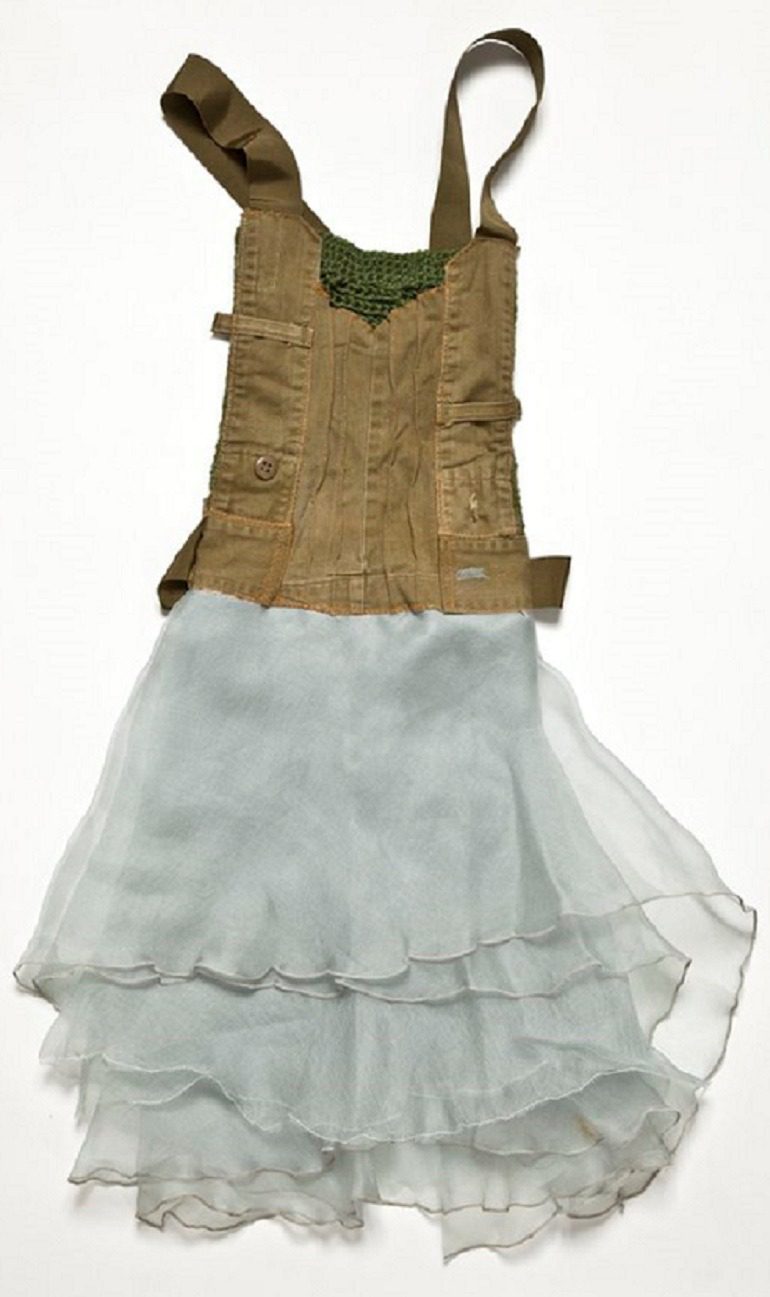ART & DESIGN
Middle East Issues Relived in Batia Shani’s Afraid to Become Prisoner of War, 2015. Embroidered envelope, 13.2 x 18.4 cm. Image courtesy of Tamar Dresdner Art Projects
ART VIDEO
Middle East Issues are relived in Batia Shani’s new works. She addresses the issue of war, terrorism, and trauma in the Middle East.
BY KAZAD
Middle East Issues: War, Terrorism, and Trauma
Tissue is made of envelopes on which Batia Shani embroiders her fears in Hebrew, Arabic, and English. Complementing the embroideries are handmade miniature dresses, made out of fabric scraps and pieces of army uniforms. ‘These dresses are a visualization of a perpetual state of simultaneous absence and presence,’ Shani notes.
Unstable Political Situation in the Middle East: Anxiety and Fears

For more than a decade now, Middle East news has been filled with devastating stories of war, civil unrest, and terrorism. From the war between Israel and Palestine to unrest in Egypt and the Syrian war, the news has been heart-shattering.
Looking at the Middle East map, almost all the countries are in trouble. Political unrest and the fear of terrorism pervade the whole area. From Syria to Egypt to Iran, Yemen, Lebanon, Israel, Palestine, Jordan, and many others, every day comes with the fear of impending danger.
Of late, however, Iraq has become the focus of attention in the Middle East. The incursion of ISIS, the terrorist group that has continued to kill Christians, Muslims, and Westerners, has made Iraq the center of unrest in the Middle East. In addition to the killing of innocent people, ISIS has also tried to eradicate the rich history of Iraq by destroying important ancient artifacts. In a recent video by the group, members of the terrorist group appear to be destroying original Assyrian artifacts at Mosul Museum in northern Iraq. The group also went after historical artifacts at the nearby Nineveh archaeological site with the main objective of eliminating the history of the Assyrians.
ART FAIR | ALSO READ: Volta Art Fair Ends in Basel With Great Applause
A section of Shani’s installation addresses the fears and anxiety now part of the endless unrest in the Middle East. One of the works titled Afraid to become A Prisoner of War, 2015, touches on the greatest fear of many people in the Middle East. With the beheading of people by ISIS in Iraq and the capturing of Israeli soldiers by Hamas in Palestine, this piece touches on the heart of the trepidation that has overtaken many citizens of the Middle East nation. Embroidered on an envelope, the 13.2 x 18.4 cm piece exposes suppressed fear that has traumatized many citizens of Middle Eastern countries.
Shani has had direct experience of fear and anxiety. She is an Israeli social worker who has worked with people suffering trauma as a consequence of war, terrorism, and bereavement. That experience is even more explicit, based on her role as a wife and mother of Israeli soldiers. Untitled captures the cumulating experience of fear and anxiety in the Middle East. The 2015 piece encapsulates the trauma that comes with uncertainty, an unstable political situation, and war. Embroidered on 2 envelopes is the sentence: “I am afraid to carry on the trauma my parents experienced as holocaust survivors.” This statement aptly captures the pain dominating the minds of Middle Easterners.
Middle East Issues Relived: Masculinity, Femininity, and Shift of Identities
Beyond the fear and anxiety created by war, Shani’s installation also addresses the issue of masculinity and femininity as it affects the life of a soldier. A section of the installation features dresses the artist made during the 2014 war in Gaza. The dresses incorporate male uniforms associated with the war within the feminine dresses. Although the images create a sense of confusion, they are very revealing. They reveal the dual composition of the brave soldiers who fight in wars. While the soldiers are bold on the war front, showing off their masculinity, in their private moments, however, they cry and mourn the loss of friends even as they struggle with the trauma of war.
Presented by Tamar Dresdner Art Projects, Batia Shani’s installation represents her tumultuous experience in the Middle East. But more importantly, it reflects her experience of her homeland, of Israel. Born in 1954 in Haifa, Israel, Shani has had direct experience of wars, terrorism, and political unrest. Her work as a social worker also brought her in close contact with the impact of trauma on people.
It is not surprising that Shani will use her work to address these heartbreaking issues. Her experience of events in her homeland makes her a witness. Shani has a BFA from Haifa University, School of Social Work, Israel. After graduating in 1977, she went on to The Royal School of Needlepoint, London, UK. Later, she went to Midrasha, Calmania, School of Art, Beit Berl College, Israel. Her works, made up of embroidery and painting, have been featured in museums and galleries across the globe.

